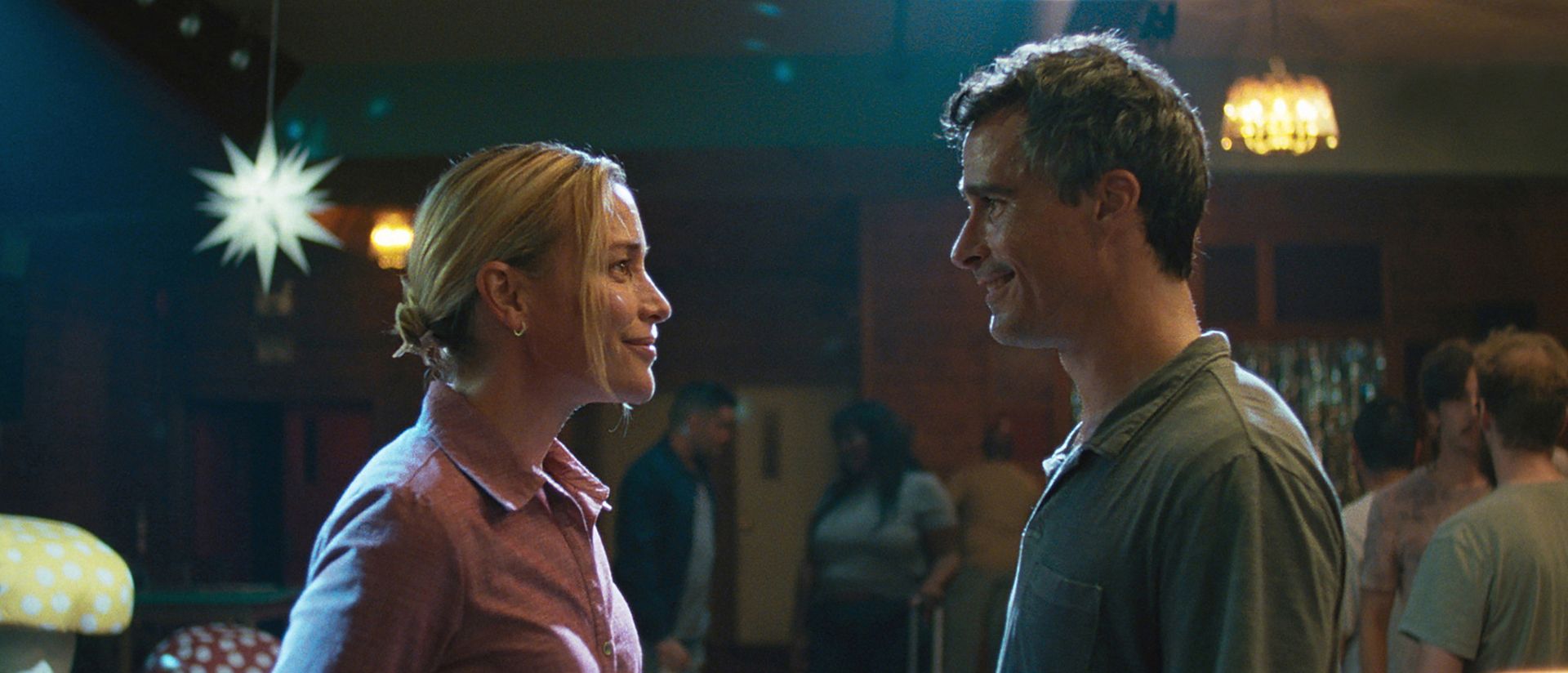Written and directed by Anne Émond, “Peak Everything” (2025) is about the present-day anxieties that are consuming most of us. The world is rapidly getting worse, and it seems like there’s no turning back. Despite the evident signs of the ecological crisis at hand, the authority figures are busy tending to their bloated egos and refusing to even acknowledge its presence. Émond’s script uses these worries to dive into the mind of a 40-something single man living in a small Canadian town, seemingly isolated from the rest of the world. It seems like an island in itself, much like he does.
Adam (Patrick Hivon) is a painfully reserved man who rarely interacts with anyone beyond his immediate family: his father Eugene (Gilles Renaud) and his brother Frank (Eric K. Boulianne). However, they seem to be of no help to him. They ridicule him for his loneliness, considering it a purely self-imposed burden, sidestepping any responsibility. They remain physically present in his life but not emotionally, which keeps him in a shell, afraid to express or do anything beyond what is expected of him. He runs the kennel with a rudimentary passivity that looks and feels oppressive.
It’s clear that he longs to be with someone or at least be frank about his ever-growing emotional burden. Yet, no one pays heed to what he is going through. Instead, he gets used, and manipulated, which makes him want to make his world even smaller. Émond’s script follows this internal dissonance between wanting to expand his horizons and getting pulled back into an increasingly deepening psychological hole. Everything in Adam’s life leads him to more self-loathing and little self-compassion. Even tending to dogs does not feel like much of an effective distraction or act of self-fulfillment.
Amid this intense sense of detachment, he meets Tina (Piper Perabo), a customer service representative for a company that sells solar lamps. From then onwards, the film becomes about their whirlwind romance. She seems like just the kind of voice he seeks in his life: kind, compassionate, and non-judgmental. It’s almost like they were destined to meet each other, and she was fated to fill the hole in his life and make him feel okay with pouring his heart out. Even then, there is an undercurrent of eco-anxieties affecting both. The solar lamp becomes rather an excuse for them to confront their fears and desires.
With neatly laden environmental metaphors, Anne Émond’s “Peak Everything” becomes a thoroughly charming affair, filled with infectiousness and irresistible cuteness. Whether the lightning strikes or the world gets on fire, the only person they want to be with for the final ride is their soulmate. The film captures this emotion with a tender sentimentality that rarely hits a false note or feels trite. Émond’s direction is a key to its gorgeousness, and so are the performances by her leads, Patrick Hivon and Piper Perabo. The romance is essentially about Adam and Tina feeling seen or heard for the part they feel ashamed or guilty for.

Hivon and Perabo reveal these concealed parts of their characters with the required restraint and clarity. On the surface, Tina is effervescent while Adam is nice to a fault. However, they are both burdened by the emotional weight of their existential dread. Despite all these positives, my main gripe about the script would be Perabo’s underdeveloped character. Her Tina reminded me of Scarlett Johansson’s A.I. character in “Her,” which offers a sense of comfort to Theodore’s mind, burdened by the oppressive detachment of the modern world.
“Peak Everything” similarly contextualizes Adam’s loneliness, where the ecological crisis becomes a conduit. Yet, the script doesn’t delve enough into Tina’s personality besides how she is with him. Ideally, that should have been the case, since she is sentient, unlike Samantha from the Spike Jonze film. Here, Tina, being mainly just a source of Adam’s comfort, feels like a misjudged choice because the script doesn’t do enough to contextualize her drive toward him.
It also leaves room for exploring at least a few things that it introduces across its runtime. For starters, it shows Adam worrying about the impending doom in front of Tina’s ethnically-Asian adopted daughter. The script never fully develops his detachedness from the impact of conflicts beyond anyone but himself. It also doesn’t engage in introspection or change even after centering itself around an inherently political ecological crisis. Although Adam is kind and well-meaning, he is so self-engrossed that the film gets consumed by his anxieties and doesn’t lead him to have much character development.
As a wish-fulfillment fantasy, “Peak Everything” works incredibly well, but it falls short when it comes to fleshing out the things not going on in his head. Yet somehow, that doesn’t take away any inherent charm of its romance, which also doubles up as an ode to the strength of human connection.






![Mangsho [2020] Short Film Review: Raw, Unpleasing and Unforgiving](https://79468c92.delivery.rocketcdn.me/wp-content/uploads/2020/05/Mangsho-768x370.png)
